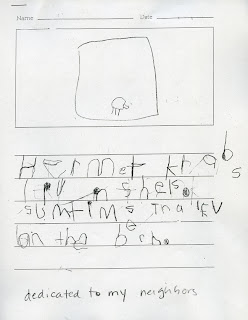
As literacy teachers, we are able to value little victories and see each tiny step towards more conventional writing skills in children as fabulous achievements. However, this may not be the case for how the families and communities of young children experience the writings and stories that these children put their hearts into telling. Educating families and others surrounding these young, progressing minds on what "good" writing is, and the processes that it takes to achieve more advanced writing skills will allow these people to feel enabled to nurture and be dazzled and delighted on what the children can do.
The most important ideas that we can educate the public about are the following;
1. Writing is a system of symbols. If a child can understand this, then they have mastered the first challenge for successful writing. We must look to the meaning of children's writing, not the conventions.
2. Drawing is an effective way of communicating. Parents should look at their children's drawings and see them as plans for writing, much as an outline or venn diagram would be used for an older student. Taking the leap from distinguishing drawing from writing is one that will come in time, but until then, take joy in the pictures and the meanings that they portray.
3. Letters can be written in different ways. Children see letters as flexible tools whose physical appearances can be experimented with. If a child is intending to write a "b" and he writes a "d" this is still a positive step towards imporved writing. We should encourage parents to find the meaning that their child is intending and to not jump to the conclusion that their child is dyslexic or has some other impairment.
4. Words can be spelled in many different ways. If a child spells a word incorrectly, they have still been able to sound it out with their knowledge of phonemic awareness and some memorization, and as long as meaning is being intended, it is okay to have misspellings.
The example below shows a student's story about hermit crabs. Although her some of her words are misspelled, her spacing isn't perfect, and her letters and in the best of form, we can see meaning.

The most important idea to get through to parents and the community is postive encouragement no matter what stage in literacy development a child is in. Happy feedback from parents or others that the students look up to will encourage them to continue to put effort into writing, and this practice will lead our children to making enormous bounds in their abilities.
No comments:
Post a Comment